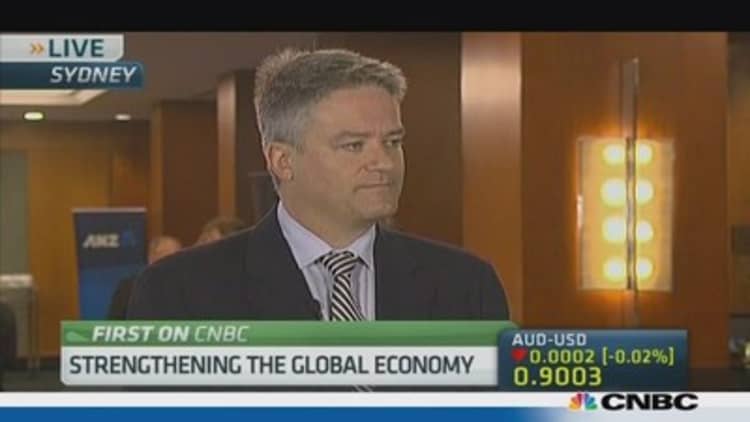
Australian Finance Minister Mathias Cormann told CNBC he was not satisfied with the performance of Australia's economy, despite the International Monetary Fund's recent praise of the nation's finances.
In an annual report on Australia released on Wednesday, the IMF highlighted how well the nation's economy has performed relative to others since the financial crisis, but it noted a number of external and domestic risks, including a slowdown in China, a frothy domestic property market and an overvalued currency, amongst other factors.
"It's true we are not in as challenging a position as other parts of the world but we think we can do better," said Cormann.
(Read more: Australia's inflation spikecreates dilemma for central bank)
"Right now the economy is growing below trend, unemployment is rising and the government is working very hard to turn that around, essentially by focusing on policies to bring down the level of taxation. [They are] scrapping things like the carbon tax and mining tax, bringing down the cost of regulation, improving regulatory certainty [through] investment in productivity enhancing infrastructure," he added.
Often described as the 'lucky country' Australia's economy held up relatively well after the global financial crisis of 2008, enjoying an average 3.5 percent growth rate from 1960 to 2013, helped by a boom in its mining industry.
However, with the boom said to be over, demand from Australia's largest trading partner China waning and a relatively strong currency damaging the country's international competitiveness, analysts have turned more cautious on the nation's economic outlook. For instance, last year investment bank Goldman Sachs downgraded its forecast for Australian growth in 2014 to 2 percent from 2.4 percent.
(Read More: Are fears ofan Australian housing bubble overblown?)
Cormann's comments followed Federal Treasurer Joe Hockey's call for stricter global growth targets on Thursday, ahead of this weekend's Group of 20 (G-20) meeting of finance ministers and central bankers in Sydney.
The Finance Minister reiterated Hockey's comments and said Australia was relying on a better performance in the rest of the global economy.
"At any one point as you are managing an economy there are things that are under your direct control and things that aren't," he said.
(Read more: Australia to be'odd one out' in 2014: Goldman Sachs)
"Part of the reason why we were so keen for the G-20 to commit themselves to hard targets for stronger growth is that obviously it would be good for Australia too," he added.
Asked whether he was happy with the current level of Australia's Australian dollar, given its relative strength in recent years, Cormann emphasized that the currency was controlled by market forces alone.
"Obviously it [the Australian dollar] has been quite high in recent years for a range of reasons like high terms of trade and circumstances in other parts of the world," said Cormann.
(Read more: 2014 a 'litmus test'for Australia economy: Goldman)
"The Australian dollar has had an impact on our international competitiveness, in particular for our manufacturing and exporting industries. But the Australia dollar will be what it will be based on what the market determines," he added.
Late last year the Reserve Bank of Australia Governor Glenn Stevens said he would be happier with the Australian dollar at levels of around 85 cents.
The Australian dollar traded at $0.9008 on Friday in Asia.
— By CNBC's Katie Holliday: Follow her on Twitter @hollidaykatie


